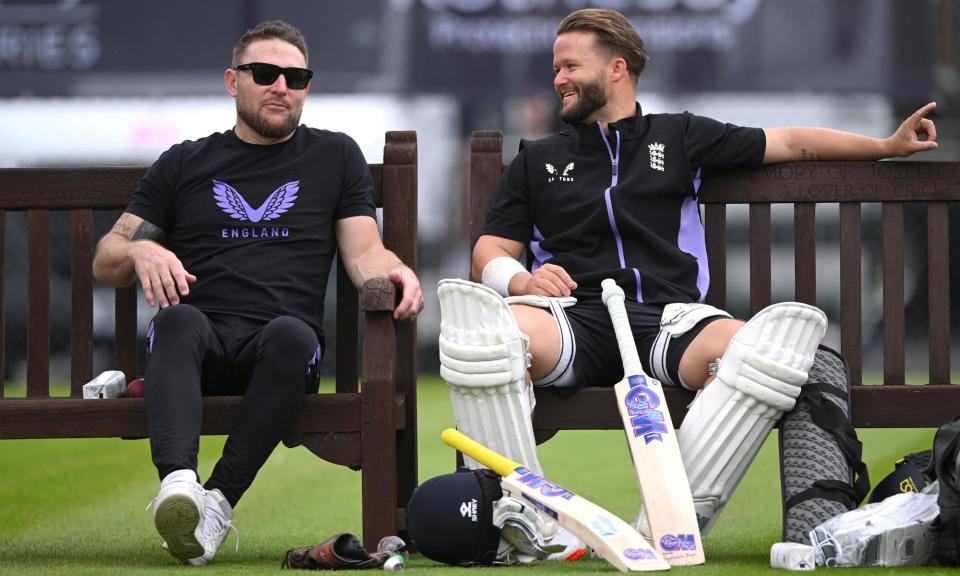England refine Bazball approach to play smarter and avoid recklessness

Brendon McCullum is not exactly Charlotte Dujardin when it comes to working his stable. After cancelling training on Wednesday, the England head coach opted to give his players just a brief run out 24 hours before the third Test against West Indies; a quickfire session that was done by midday and then moved to Little Aston golf club.
This laissez-faire approach has very much been the way under McCullum and Ben Stokes over the past two and a bit years, the pair judging training by quality rather than quantity. In terms of individual preparation, players can dictate their own schedule to a degree; they can ask a coach to facilitate an extra hit if they feel undercooked, equally, if cherry ripe, they can decide not to come to the ground at all.
Related: Mark Wood backed to break new ground and 100mph barrier in Test cricket
Ben Duckett turned up on Wednesday after the birth of his daughter at the start of the week – a little bleary-eyed – but a day out from his Test debut a fortnight ago, for example, Jamie Smith stayed away from Lord’s.
“A few years ago, that might have been looked upon badly,” said Stokes. “I’m someone who feels that as soon as you’re doing something because you think it’s the right thing to be seen doing, then it’s absolutely pointless. It’s just wasted energy.”
While this approach to training has been a constant, England are looking to evolve on the field this summer. Like the start of Eoin Morgan’s white-ball revolution after the 2015 World Cup, the first half of McCullum’s four-year term was about expanding minds and pushing the limits of possibility with the bat, with Stokes very much driving it through his own aggression. There was also the odd madcap declaration that blew up in their faces, like the first Ashes Test at Edgbaston last year. But after the 4-1 defeat in India earlier this year, McCullum accepted that a degree of recklessness had been getting the better of them at times and “refinement” was the next phase of the project.
Stokes dislikes the word “ruthlessness”, claiming it is only ever spoken about after the outcome. But refinement appears to sit all right with him and during the 241-run victory at Trent Bridge last week – one that sees England 2-0 up against West Indies and eyeing a third clean sweep of his captaincy – the all-rounder fancied there was some on show. The third innings could easily have been unravelled by past excess when England found themselves effectively 99 for three in soupy, overcast conditions. Yet Harry Brook and Joe Root pushed back in a controlled but assertive way, maintaining England’s cruising speed of 4.5 an over in a stand of 189 without taking many risks along the way. Notably, it was also England’s first innings in their last 19 where they did not hit a six.
Root in particular appears more comfortable these days, not that he was going too badly beforehand. During the first two years under Stokes he averaged 52 but spoke openly on occasion about being unsure of his role. From the outside, the reverse ramp almost became emblematic of a desire to fit in with the dashers. But having triggered a series-defining collapse in Rajkot back in February, the shot was mothballed and only came out in Nottingham once his 32nd Test century was secured and the lead was just shy of 350. It may be that Root has realised that simply being himself benefits everyone.
“We still obviously like to apply as much pressure as we can, even if the bowling conditions are in the opposition’s favour,” said Stokes. “But I think you can see there is a bit more smartness around the way in which we play. The run-rate is the same but it just doesn’t feel like it’s as expansive, if that makes sense. There’s now a real understanding as individuals that how they play is different to the other person. I just thought it was a brilliant partnership and a sign of the progression we made over the two years.”
England: Zak Crawley, Ben Duckett, Ollie Pope, Joe Root, Harry Brook, Ben Stokes (c), Jamis Smith (wk), Chris Woakes, Gus Atkinson, Mark Wood, Shoaib Bashir.
West Indies: Kraigg Brathwaite (c), Mikyle Louis, Kirk McKenzie, Alick Athenaze, Kavem Hodge, Jason Holder, Joshua Da Silva (wk), Alzarri Joseph, Gudakesh Motie, Shamar Joseph, Jayden Seales.
Umpires: Nitin Menon and Adrian Holdstock
Third umpire: Rod Tucker
Fourth umpire: Russell Warren
It remains a pretty small sample size and one that must also factor in a West Indies team that has battled to simply compete. Not that England are minded to shake things up this week. Stokes named an unchanged XI, meaning Matthew Potts and Dillon Pennington must continue to wait their turn. Stokes insisted it was better for spots to emerge naturally, rather than be forced, and Mark Wood, who touched 97.1mph and broke poor Kevin Sinclair’s forearm, is unlikely to play all three against Sri Lanka.
In the summer when England pensioned off Jimmy Anderson citing an eye towards the future, this couldstill be viewed as a contradiction of sorts; a missed opportunity to find out more about the uncapped Pennington, for example. By the same token, Gus Atkinson, a fast bowler who dips in and out of Surrey’s championship side, is now being challenged with a third Test match in the space of three weeks. Whether he thrives or struggles with the rigours of this, England will have still learned something.

